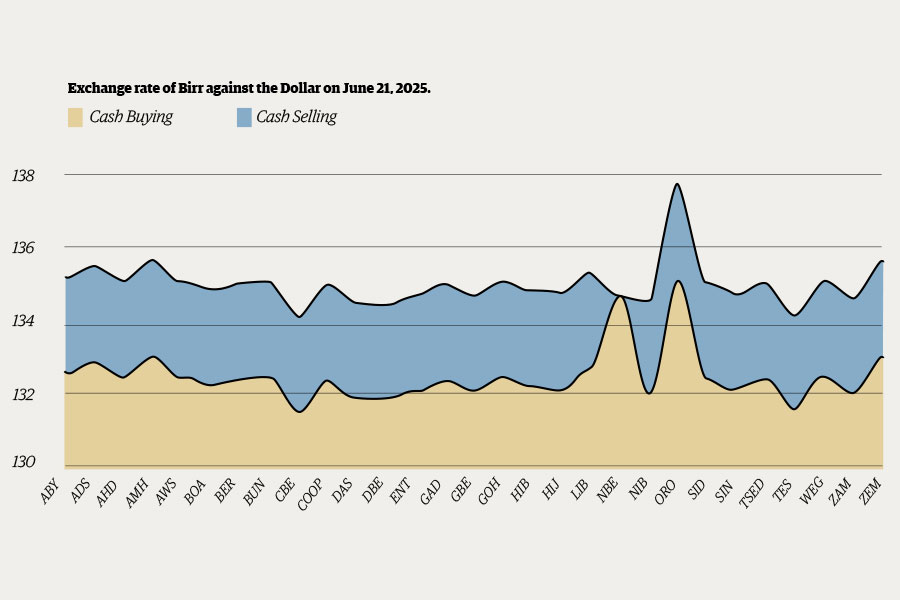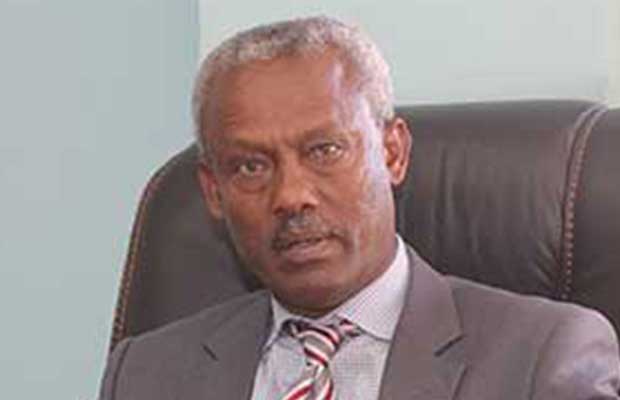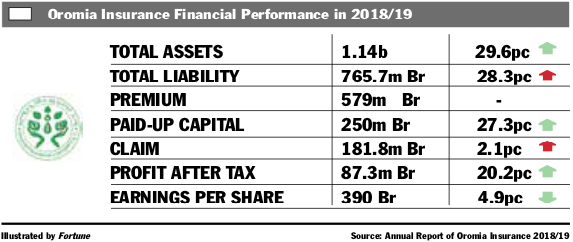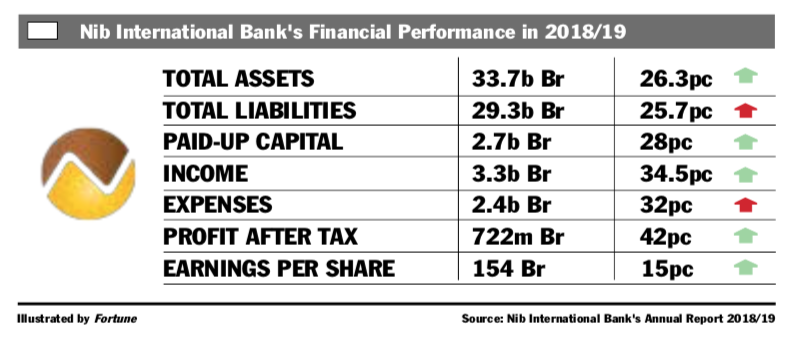
Fortune News | Jun 05,2021
Bunna Insurance, one of the youngest insurance firms in the country, has netted 20 million Br in profit during the last fiscal year. The net profit, however, was 25pc lower in comparison to the preceding year.
The firm’s earnings per share (EPS), the net profit divided by the number of shares owned by the firm's 634 shareholders, also plunged by 11 Br to 16 Br. The reduction in EPS was caused by a drop in profit combined with a massive injection of fresh capital. During the reporting period, the insurance firm boosted its paid-up capital by 29pc to 145.2 million Br.
Despite the decline in profit and EPS, Bunna was able to boost its gross written premium earnings by 22pc to 249.2 million Br, of which the company retained 78pc. Bunna's retention rate was slightly higher than the industry average of 77pc recorded two years ago.
Zewdu Minas, the board chairperson of the seven-year-old Bunna Insurance, says the firm achieved premium growth despite the high market decline due to Novel Coronavirus (COVID-19) and other challenges.
A surge in claims coupled with rising operating expenses were the main culprits for the reduction in Bunna's profit. The total claims paid and provided for increased by 45pc to 122 million Br.
The rise in claims considerably undermined the performance of Bunna, resulting in a 19pc reduction in underwriting surplus to 27.9 million Br.
"Over-target paid claims and high reserve for unexpired mega-risk insurance coverage has made a negative impact on the budget year’s underwriting result," said Zewdu.
The significant increase in claims needs serious attention from management, according to Abdulmenan Mohammed, accounts manager at the London-based Portobello Group and a financial statement analyst with close to two decades of experience.
Motor insurance policy and carriers liability, a policy that covers risks of transported goods and merchandise, were the reasons for the rise in claims, according to Dagnachew Mehari, CEO of Bunna, which recently launched the carriers liability policy.
"After COVID-19 was reported in the country," said Dagnachew, "the Ethio-Djibouti corridor was busier than usual transporting different imported items."
Because of the congestion on the corridor and stress on the drivers since Djibouti had a higher number of confirmed COVID-19 cases at the time, there were recurrent accidents, according to Dagnachew.
"These led the firm to spend more to cover the claims for loss or physical damage to the vehicles, death compensation claims, as well as the cargo carried on the trucks," said Dagnachew.
Direct operating expenses also increased by 13pc to 23.5 million Br, while general administrative costs and salaries and benefits went up by 37pc to 42.3 million Br.
The growth of expenses at Bunna is concerning and the management should closely monitor the expansion of expenditures, according to Abdulmenan.
Dagnachew, who considers employee issues an internal risk, says that last year the company paid a bonus to its employees as an incentive and recruited high-caliber staff with experience, which cost the company more money.
During the past fiscal year, the firm hired 36 new employees, pushing the total number to 171. It also opened three new branches, bringing the overall number to 24 plus two contact offices.
"The firm is nothing without its employees," said Dagnachew, who added that Bunna has started conducting an employee satisfaction survey this year. The firm's risk department will conduct the survey regularly, according to the CEO.
Last year, the firm spent nine million Birr in interest on the 169-million-Br bank loan it borrowed to purchase a six-storey building located near the African Union. Procured seven months ago, the building is currently serving as the headquarters of the firm.
Despite a rise in expenses, Bunna did well in investment activities. Interest income increased by 26pc to 20.4 million Br, while dividend income went up by 71pc to 13.7 million Br.
It earned a commission of 16.5 million Br, an increase of eight percent, and paid 14.6 million Br in commissions to agents, an increase of 15pc.
The total assets of Bunna increased significantly. Total assets soared by 51pc to 634 million Br. Out of this, 167.4 million Br and 95 million Br were invested in savings and other investments such as shares, respectively. These investments decreased to 41.4pc of total assets from 56.7pc .
"This is a good investment strategy," commented Abdulmenan.
Liquidity analysis shows that the liquidity level of Bunna decreased in both value and relative terms. Cash and bank balances decreased by 16pc to 33.3 million Br. The ratio of cash and bank balances to total assets decreased to five percent from nine percent.
Bunna needs to take caution against a further reduction in liquidity, according to Abdulmenan.
The firm is working on maintaining its liquidity status as well as meeting the requirements of the central bank, which stipulates that insurance firms keep 60pc of their assets in cash, according to Dagnachew.
"That's why we took a bank loan to buy the building," Dagnachew told Fortune.
The capital and non-distributable reserves of Bunna account for 24.6pc of its total assets. The firm is a well-capitalised insurance company, according to the expert.
"Bunna should use its capital to bring in more returns," said Abdulmenan.
The financial performance of the firm put it in the 13th position of the industry, which has 18 insurance companies operating with 605 branches across the country. The capital of these firms reached nearly 9.7 billion Br during the reporting period.
Lemma Woldaregay, the founding shareholder of the firm, also says he is satisfied with the outcome.
“Despite the challenges brought by the pandemic,” said Lemma, “the firm performed well.”
Lemma, who is also one of the founders of Bunna International Bank, buying shares for 3,000 Br, also but seven shares at Bunna Insurance when the firm made its second-round share sale before it became operational a few years back.
Lemma, whose number of shares has doubled without new investment, is optimistic about the future performance of the company, saying that Bunna has already overcome the previous year’s challenges.
“Now it’s trying to stand on its own two feet,” said Lemma.
PUBLISHED ON
Nov 29,2020 [ VOL
21 , NO
1074]

Fortune News | Jun 05,2021

Money Market Watch | Jun 21,2025

Exclusive Interviews | Jan 05,2020

Fortune News | Feb 25,2023

Fortune News | Mar 09,2019

Fortune News | Jan 25,2020

Fortune News | Mar 07,2020

View From Arada | Jul 23,2022

Fortune News | Jun 19,2021

Radar | May 09,2020

Dec 22 , 2024 . By TIZITA SHEWAFERAW
Charged with transforming colossal state-owned enterprises into modern and competitiv...

Aug 18 , 2024 . By AKSAH ITALO
Although predictable Yonas Zerihun's job in the ride-hailing service is not immune to...

Jul 28 , 2024 . By TIZITA SHEWAFERAW
Unhabitual, perhaps too many, Samuel Gebreyohannes, 38, used to occasionally enjoy a couple of beers at breakfast. However, he recently swit...

Jul 13 , 2024 . By AKSAH ITALO
Investors who rely on tractors, trucks, and field vehicles for commuting, transporting commodities, and f...

Nov 1 , 2025
The National Bank of Ethiopia (NBE) issued a statement two weeks ago that appeared to...

Oct 25 , 2025
The regulatory machinery is on overdrive. In only two years, no fewer than 35 new pro...

Oct 18 , 2025
The political establishment, notably the ruling party and its top brass, has become p...

Oct 11 , 2025
Ladislas Farago, a roving Associated Press (AP) correspondent, arrived in Ethiopia in...